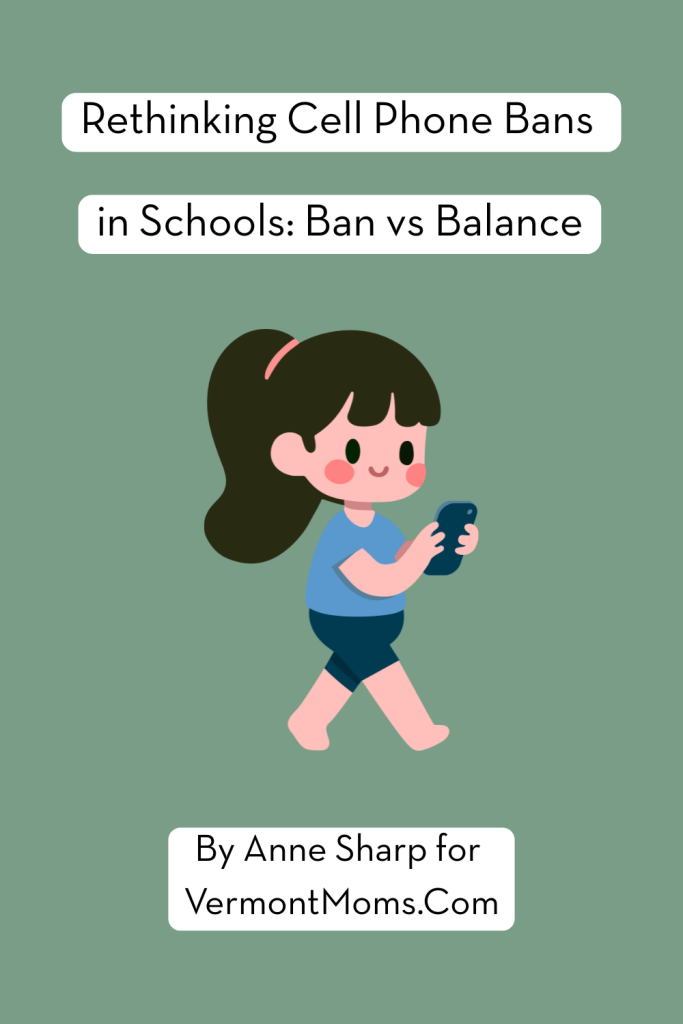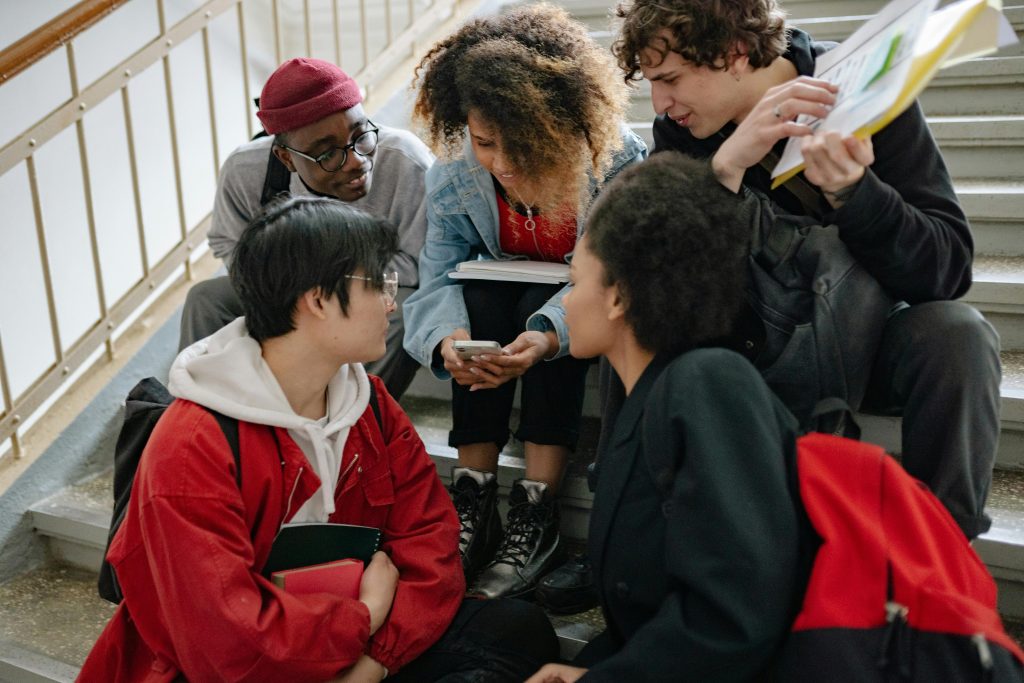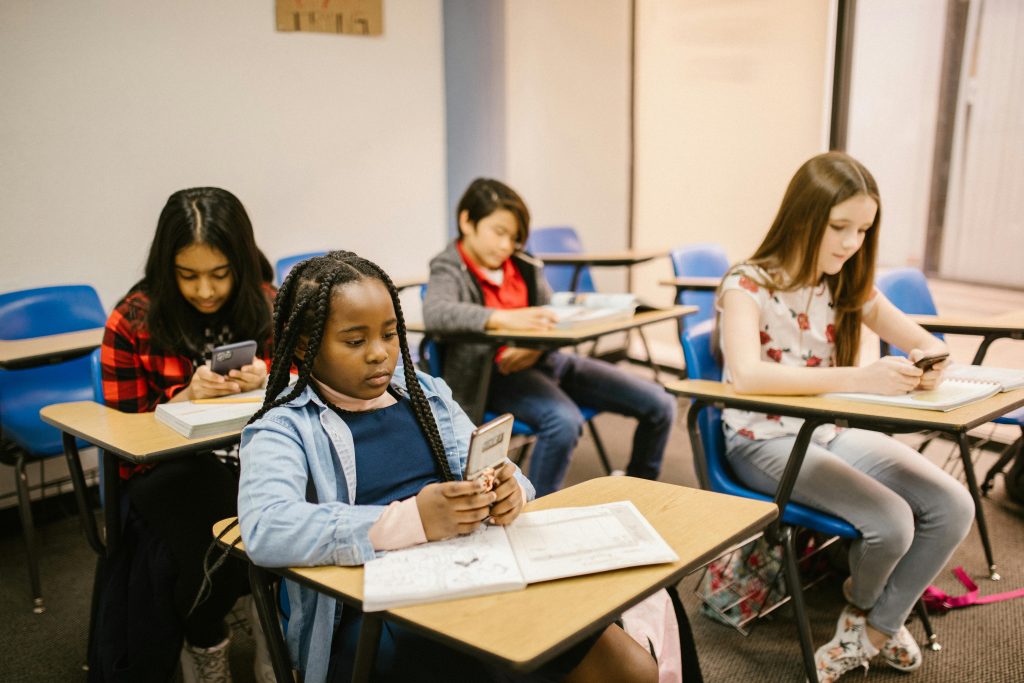Let me just say it: I’m a mom, and I don’t think banning cell phones from school is the answer. Cell phones should be allowed in school – really! We need to start rethinking cell phone bans in schools. Let’s find the truth in ban versus balance.
I know I’m not expressing a popular opinion. I’ve heard the arguments against phones in school– they’re a source of distraction, social media fosters drama, and kids become glued to screens instead of paying attention. Believe me, I’ve seen it in our community and at home. But I also see something else: a huge missed opportunity when we treat phones like the enemy instead of teaching young people responsible use and balance.
And here’s a truth we don’t talk about enough: adults aren’t exactly setting the best example. We tell our kids they’re on their phones too much, but how often are we scrolling Instagram at the dinner table, checking emails at the playground, or texting during family movie night?
Let’s be honest, this “Do as I say, not as I do” approach doesn’t work. Kids notice. They copy us. If we don’t model healthy phone use, how can we expect them to figure it out on their own? We turn around and say, “No phones at school because phones are bad for my kid,” as we sit on our phones.
Stop saying no phones and start asking schools to teach kids to use their phones properly by rethinking cell phone bans in school and making sure our kids are educated on technology, not simply banned from it.
The reality is – cell phones aren’t going anywhere. In fact, they’re only becoming more essential to how we live, learn, and work. Why are so many schools banning them outright? Instead of removing phones from the learning environment, I believe we should be teaching students how to use them responsibly, respectfully, and productively.
Our children are growing up in a world where smartphones are part of nearly every job, from communication to research to project management. They will absolutely need to know how to use technology – and not just use it, but use it wisely, thoughtfully, and confidently. Why wouldn’t we help them practice that in the one place that’s meant for learning?
Schools should be the starting place for learning digital literacy, and that includes allowing cell phones in school. Instead of a ban, we need balance.
I’m not saying phones should be out in class, and I’m absolutely against kids messing around on social media while they’re in school, but banning phones completely feels like giving up on teaching kids how to manage them. As a parent, I’d rather we teach our kids how to handle the real world than pretend it doesn’t exist. We already do not teach them enough about today’s technology to prepare them for college and jobs.
Let me share reasons why I think we should rethink the “no phones in school” rule, and what I’d love to see instead.
Phones Are a Part of Life—Let’s Teach Kids to Use Them in Their Lives
Our kids are growing up with a phone in their pocket. Probably for the rest of their life, it’ll be how they check work emails, schedule and host meetings, look up information, and connect with people. It is what I do for work, so why would I expect them not to? Doesn’t it make sense to start teaching them how to do those things now, while we’re here to guide them?
I didn’t let my kids have phones until they were 12, and only because I wanted to be able to stay on top of them as they began exploring the world more on their own – walking to a friend’s house, attending afterschool activities, going to sports for hours without me. A cell phone is a lifeline to knowing your kid is safe and can contact you; we all rely on them these days as parents.
My kids also knew they had limited phone access – no phones at the table, no social media, open passwords so I could check them if I wanted, no phones in their rooms, phones must be left at the door when they walked in, and used when they left. And they certainly knew they had better not get caught using them at school when they were not supposed to, or they would lose them immediately!
I taught my kids how to use (and put down) their phones and best manners for activities with friends and family. They know about privacy and the fact that our information lives on the internet forever. They understand how and why to Google themselves and how their interactions leave a digital footprint.
Predictably, my kids were not perfect; I remember an inappropriate text I flipped out on my son about, and a video my daughter made with a friend that was put on TikTok – that resulted in days of talking about how to present yourself, what others can see, who you want to be as a person, and the complete removal of the app and electronics (a lesson she never forgot)!
Mistakes are learning experiences. Let’s not treat phones like forbidden fruit, as the same temptations we fear are available on the same computers in front of them for school. Let’s instead treat phones like the powerful tools they are and teach kids how to use them without being used by them. We can start that by rethinking cell phone bans in schools.
Phones Can Help Kids Learn (If We Let Them)
I’ve watched my kids use their phones to:
- Take pictures of the whiteboard when she runs out of time
- Use a calculator or language app for homework
- Set timers to manage study breaks
- Look up how to solve math problems when she’s stuck (not for the answers, but for step-by-step instructions)
- Read books in downtime or play brain games for stimulation
That’s not a distraction, that’s smart learning.
Instead of banning phones, why not teach kids when and how to use them in class or any social setting? Let them experience the difference between helpful tech and just scrolling for the sake of it.
Social Media Isn’t Going Anywhere – So Let’s Talk About It Too
I know the dangers of social media. I worry, too. Likes, follows, group chats, FOMO, peer pressure, bullying, all of it. But taking phones away doesn’t mean those pressures disappear. It just pushes them into the shadows and forces kids to find ways to hide them.
Kids need us to talk openly about social media:
- Why it feels good to get likes, but why that’s not meaningful validation
- Why endless texting isn’t a substitute for in-person connection
- Why everything on social media isn’t reality
- Why more people commenting on something will feed a problem rather than standing up against it
- Why scrolling past bedtime makes them feel worse, not better
- How technology can be used for good, versus to amplify fear and hate
- How algorithms target them, taint what they see, and manipulate their opinions
If we want kids to grow up with a healthy relationship to technology, we have to help them build it, understand it, interact with it – not just block it.
Real Conversations Versus Constant Texting
I tell my kids: “If it’s important, pick up the phone and talk.” My daughter was concerned that a friend was suddenly ignoring her. She has had some bad relationships in the past and was worried her best friend, who lives out of state, was going to abandon her because she wasn’t texting much. I told her to call, set up a time to talk, and find out what is going on – just because she did not text, doesn’t mean she is not talking to you.
She did reach out and found out that her friend was just busy with midterms, but it was a scary time for her as she did not want to lose another friend. It is important to help kids understand that texting isn’t just reading and writing. Words can be misconstrued, texting without someone immediately responding doesn’t mean they are ignoring you, texting too much can be like stalking, and you can never relay tone in a text or truly understand what someone is really feeling. Texting does not allow for emotional insights, no matter how many emojis you use!
Phones should help us communicate – not replace connections. I try to call when I have something to say and only text when it is a quick question or a passing check-in. Nothing beats interacting with someone directly. We can model that for our kids and remind them that old-fashioned communication still matters.
I mean, have you ever texted your kid when they are upstairs to save time? Get up and go talk to them! We have a rule that you do not text in the house; come find me. Although I admit, sometimes when dinner is ready, it beats yelling at the top of my lungs!
Let’s Stop the Double Standard
I’ll say it again: kids notice what we do. If we tell them they’re on their phones too much while we’re texting during dinner or glued to social media during their soccer games, our message loses weight.
I admit I am on my phone constantly, and I hate it. I never used to be, but then I started working remotely, and my phone is a primary way I work, because I need it to be available during work hours, even if I am dropping a kid off at school.
That said, I do try to apologize if I am on the phone in a checkout line while my boss is texting something important and I get distracted. I never have an open conversation in a public place while yelling into my phone. And I always put the phone on mute if I am at an appointment or somewhere where it will be a distraction if it rings.
I shut my phone off at the table, never use it during important events, and make sure it is just for pictures when I am having family time, especially when my kids were younger.
We need to check ourselves, and our phone use, not just our kids. If we want to raise mindful, balanced digital citizens, it has to start with our habits. Let’s make it a family conversation and commitment so we can go from ban to balance.
Set Limits – But Also Trust Our Kids
I’m all for boundaries. But I want my kids to learn self-control and manners, not just follow a rule because someone enforced it. And the only way to do that is to give them chances to practice. And yes, when rules are broken, there are consequences – like losing your phone for a week.
I want my kids to have a cell phone at school so I can reach them if needed – if they’re sick, if I’m running late, or if they have new plans. I asked them once about cell phones being banned in schools, and their response was, “Parents are the only ones that text kids at school, because we are in school with each other, not texting.”
I love that our school has cubbies for phones during class. I am glad students are not permitted to be on their phones during class time, but I will never advocate for removing their phones completely.
Schools can help with learning and limits. Not by banning phones, but by guiding responsible use and creating targeted learning towards these technologies, whether it is phones, computers, Internet use, or AI. Having a class committed to today’s technology use is essential!
It all starts by rethinking cell phone bans in schools and advocating for education.
Final Thoughts: Phones Are Not the Enemy
Our job isn’t just to protect our kids from the world, it’s to prepare them for it.
Yes, phones can be distracting. Yes, phone use can present some risks. But phones also offer huge opportunities to teach, mentor, and model what healthy, balanced tech use looks like.
Phones should be embraced as a life tool, and their use should be guided in the classroom. Phones can support learning, communication, and future careers. We should be guiding kids to develop healthy digital habits – like avoiding social media traps, over-texting, and the pressure of online validation, not just taking them away as a solution.
I don’t want my kids to sneak around using their phones. I want them to know how and when to use them with confidence, purpose, and awareness of others. And I’d love for school to be part of that journey – not a place that shuts it down.
So yes, cell phones should be allowed in schools and we need to be rethinking cell phone bans. Let’s stop advocating for confiscation and start advocating for learning that suits the world we live in!
Pin this post and be sure to follow Vermont Moms on Pinterest!

Vermont Moms Insiders get exclusive content that you do not want to miss, so sign up!












